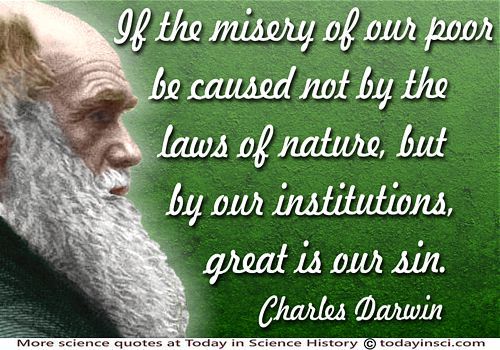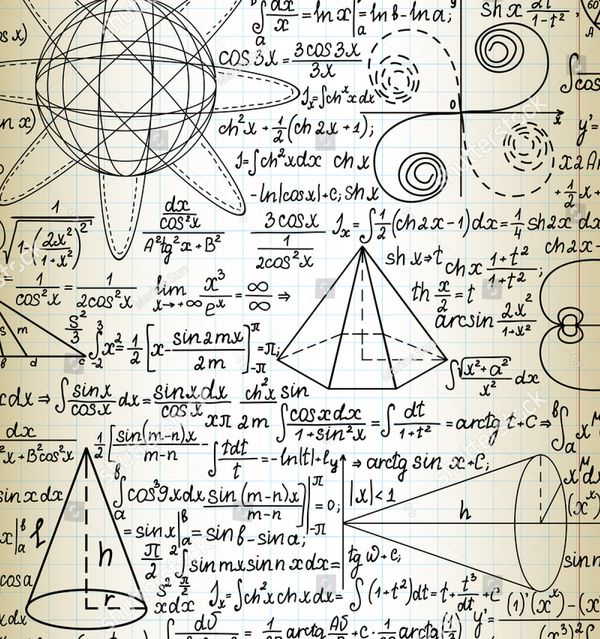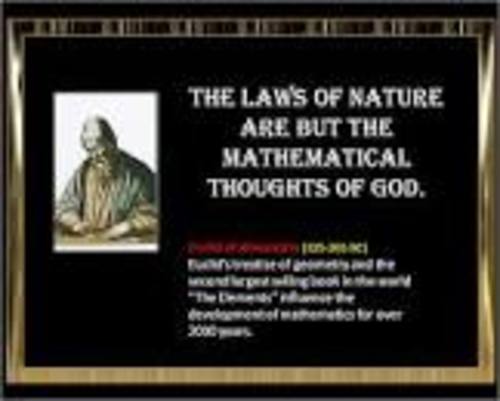LAWS OF NATURE

“Everything is energy. And that's all there is to it. Match the frequency of the reality you want and you cannot help but get that reality. It can be no other way. This is not philosophy. This is physics.” – Albert Einstein.

LAWS OFNATURE, in the philosophy of science, a stated regularity in the relations or order of phenomena in the world that holds, under a stipulated set of conditions, either universally or in a stated proportion of instances. (The notion is distinct from that of a natural law—i.e., a law of right or justice supposedly derived from nature.)
Laws of nature are of two basic forms: (1) a law is universal if it states that some conditions, so far as are known, invariably are found together with certain other conditions; and (2) a law is probabilistic if it affirms that, on the average, a stated fraction of cases displaying a given condition will display a certain other condition as well. In either case, a law may be valid even though it obtains only under special circumstances or as a convenient approximation. Moreover, a law of nature has no logical necessity; rather, it rests directly or indirectly upon the evidence of experience.

Laws of universal form must be distinguished from generalizations, such as “All chairs in this office are gray,” which appear to be accidental. Generalizations, for example, cannot support counterfactual conditional statements such as “If this chair had been in my office, it would be gray” nor subjunctive conditionals such as “If this chair were put in my office, it would be gray.” On the other hand, the statement “All planetary objects move in nearly elliptical paths about their stars” does provide this support. All scientific laws appear to give similar results. The class of universal statements that can be candidates for the status of laws, however, is determined at any time in history by the theories of science then current.
Several positive attributes are commonly required of a law of nature. Statements about things or events limited to one location or one date cannot be lawlike. Also, most scientists hold that the predicate must apply to evidence not used in deriving the law: though the law is founded upon experience, it must predict or help one to understand matters not included among those experiences. Finally, it is normally expected that a law will be explainable by more embracing laws or by some theory. Thus, a regularity for which there are general theoretical grounds will be more readily called a law of nature than an empirical regularity that cannot be subsumed under more general laws or theories.

Universal laws are of several types. Many assert a dependence between varying quantities measuring certain properties, as in the law that the pressure of a gas under steady temperature is inversely proportional to its volume (see Boyle’s law). Others state that events occur in an invariant order, as in “Vertebrates always occur in the fossil record after the rise of invertebrates.” Last, there are laws affirming that if an object is of a stated sort it will have certain observable properties. Part of the reason for the ambiguity of the term law of nature lies in the temptation to apply it only to statements of one of these sorts of laws, as in the claim that science deals solely with cause and effect relationships, when in fact all three kinds are equally valid.

Laws of Nature

Science includes many principles at least once thought to be laws of nature: Newton’s law of gravitation, his three laws of motion, the ideal gas laws, Mendel’s laws, the laws of supply and demand, and so on. Other regularities important to science were not thought to have this status. These include regularities that, unlike laws, were (or still are) thought by scientists to stand in need of stronger ground. These include the regularity of the ocean tides, the perihelion of Mercury’s orbit, the photoelectric effect, that the universe is expanding, and so on. Scientists also use laws but not other regularities to sort out what is possible:
It is based on their consistency with Einstein’s laws of gravity that cosmologists recognize the possibility that our universe is closed and the possibility that it is open . In statistical mechanics, the laws of an underlying physical theory are used to determine the dynamically possible trajectories through the state space of the system.

Philosophers of science and metaphysicians address various issues about laws, but the basic question is: What is it to be a law? Two influential answers are the systems approach (Lewis, 1973, 1983, 1986, 1994) and the universals approach (Armstrong, 1978, 1983, 1991, 1993). Other treatments include antirealist views (van Fraassen 1989, Giere 1999, Ward 2002, Mumford 2004) and antireductionist views (Carroll 1994 and 2008, Lange 2000 and 2009, Maudlin 2007). Beside the basic question, the recent literature has also focused on whether laws are determined by matters of fact, the role laws play in the problem of induction, whether laws involve a strong form of necessity, and the role of laws in physics and how that contrasts with the role of laws in the special sciences.

THINGS YOU MAY NOT KNOW: The laws of nature conform to mathematics. Is that a strange thing in and of itself? More than you realize, actually. Mathematics is ordered and follows certain rules, but there is no reason why nature or the universe should follow such rules. How can something that was created so haphazardly and randomly be so precise and consistent? All life can be expressed in mathematical equations. Nobel Prize winning scientist Richard Feynman said, "Why nature is mathematical is a mystery...the fact that there are rules at all is a kind of miracle."
THINGS YOU MAY WANT TO SAVE: Your ability to use rolling math numbers to exit the earth as did the Mayans from Central America.
ZENTRAVELER SAYS: If you think the LAWS OF NATURE ARE COMPLICATED try to set the time and date on your new digital watch?
From here to Infinity is a relatively short ride! The next leg takes eons and eons as you fly through the Barycentric Dynamical Time Zone! …and on and on and on. Follow the Zentraveler Newsletter often for Travel, Health and Zen-like stories and such. Where else can you get a THREE IN ONE NEWSLETTER FOR THE PRICE OF FREE.

ZENTRAVELER IS A PERSONAL NEWSLETTER, DESIGNED TO GIVE TRAVEL, HEALTH, WRITING AND HUMOR INCLUDING HELPFUL HINTS WITH A ZEN LIKE QUALITY.
